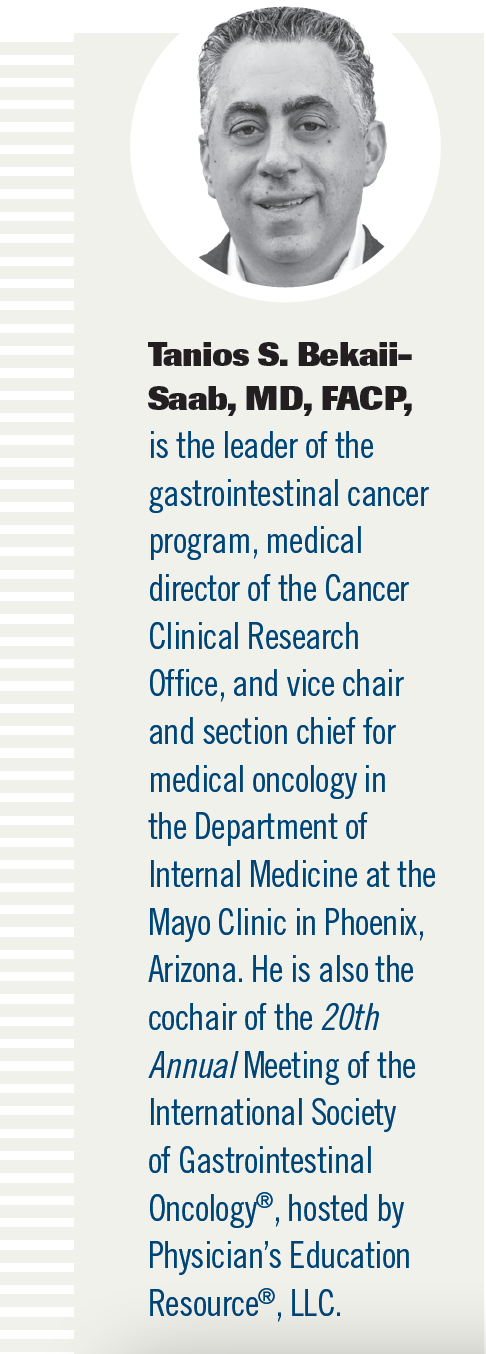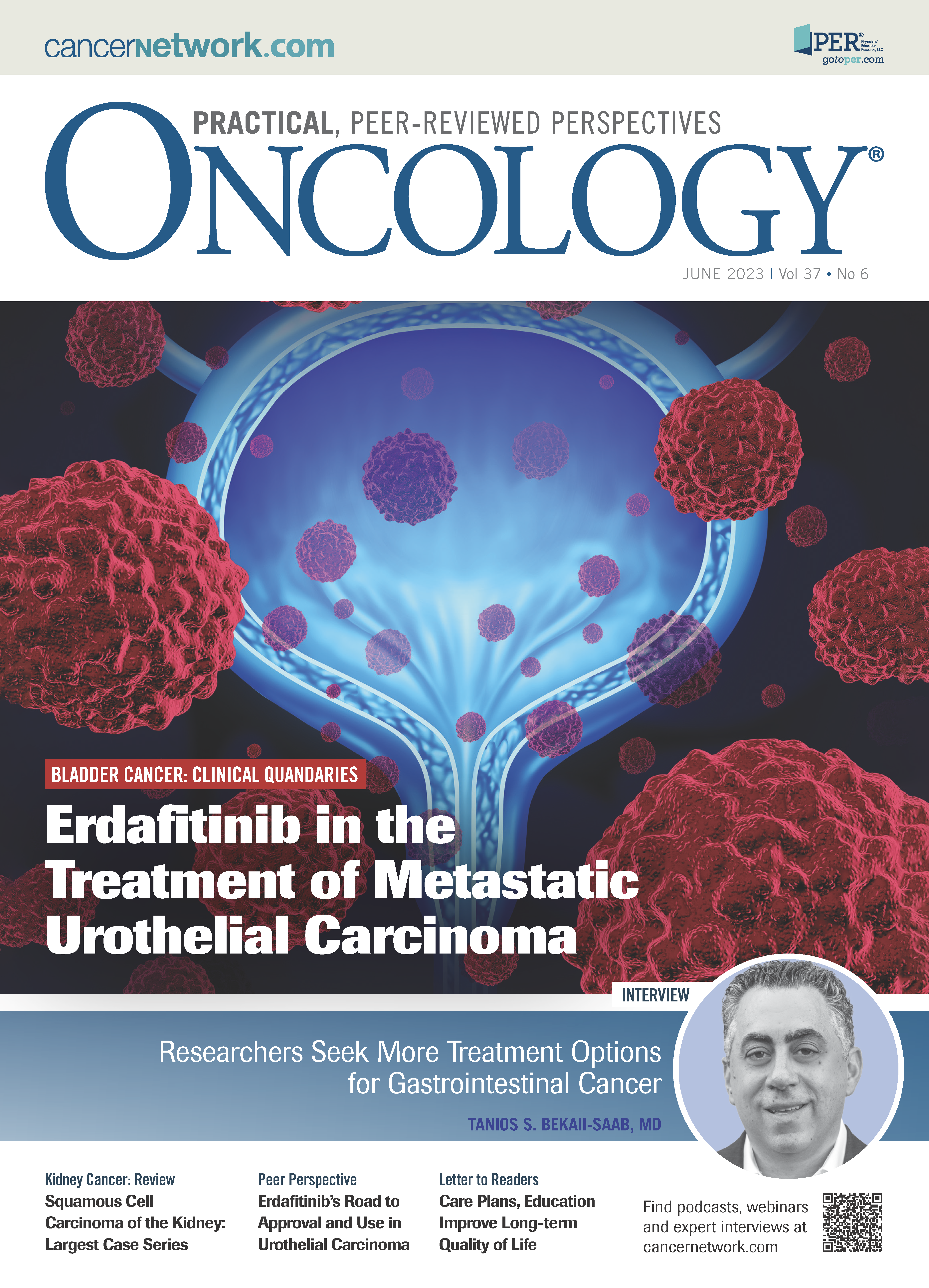Researchers Seek More Treatment Options for Gastrointestinal Cancer
“We’re starting to see a lot of benefits with targeted therapies [and] immunotherapies. Unfortunately, these [benefits] remain limited to a small subset of patients across GI [gastrointestinal] [malignant tumors]. One of the biggest challenges is how to expand those benefits to the majority of patients.”

In the current landscape of gastrointestinal (GI) cancer treatments, questions persist about whether targeted therapies or immunotherapies are better for various subsets of the population. As new treatments and combinations emerge, it is still unclear how they may affect the standard of care.
Tanios S. Bekaii-Saab, MD, FACP, discussed the current landscape and provided insight into the unmet needs of this population. Additionally, he reviewed upcoming FDA actions and how they might alter clinical practice. Bekaii-Saab also touched upon the biggest takeaway from the forthcoming meeting he chairs and why multidisciplinary practice is so important in the GI space.
Q: What are some unmet needs in the GI space?
BEKAII-SAAB: We’re starting to see a lot of benefits with targeted therapies [and] immunotherapies. Unfortunately, these [benefits] remain limited to a small subset of patients across GI [malignant tumors]. One of the biggest challenges is how to expand those benefits to the majority of patients. [Can we do it] by breaking down those various cancers that [are segmented] into smaller and smaller subgroups? With immunotherapy, can we identify better biomarkers for those [with] non–microsatellite instability–high [disease]? It is obvious that there’s a small subgroup of patients who may benefit [from immunotherapy]; it is yet to be determined [how best to identify them]. How do we best move forward with those patients while at the same time creating new ways to bring immunotherapy closer to many of these cancers? [We ask the] same [questions] with targeted therapies.
Q: How might the potential FDA approval for pembrolizumab (Keytruda) plus chemotherapy in locally advanced unresectable or metastatic gastroesophageal junction adenocarcinoma affect the current standard of care?
BEKAII-SAAB: It just consolidates the current standard [of care]. The current standard is chemotherapy plus immunotherapy. In [this type of] cancer, tumors with a higher propensity for a CPS [combined positive score] of 5 or more respond better than [those with a score of] 10 or more. For responders [with a CPS] between 1 and 5, it’s [more] mixed, and you need more of the chemotherapy. [If a patient had a CPS of] less than 1, [they are not likely to be a good candidate] for immunotherapy. Overall, immunotherapy is now part of the treatment plan for more than 60% of patients with this cancer.
Q: How important is a multidisciplinary team in the GI space?
BEKAII-SAAB: In every aspect of our care, a multidisciplinary team is important but more in the earlier stages of the disease. In HCC [hepatocellular carcinoma], for example, the multidisciplinary team remains committed to the patient all the way through until the disease becomes more advanced. You need to have pathology; you need an interventional radiologist because you need an early assessment. We’re [reclassifying] some patients [disease] from transplant ineligible to transplant eligible, from unresectable to resectable. You want that team to be present at all times.
Our modalities in HCC include locoregional approaches, [and] we’re examining the [use] of combining locoregional with systemic approaches. We heard about data from the phase 3 IMbrave050 study [NCT04102098], [which means that] adjuvant therapy with atezolizumab [Tecentriq] plus bevacizumab [Avastin] is likely to become a standard option for our patients.1 Now more than ever, there’s a need for multidisciplinary involvement.
[This is also the] same in [pancreatic cancer], at least in the early stages of the disease, and in colon cancer. Oligometastatic disease is a multidisciplinary problem and needs to be addressed with locoregional and systemic therapy in the earlier stages of the disease. Every aspect of our care in GI [cancer] requires some level of involvement from the multidisciplinary team, [and] for some aspects of our care, you need the full involvement of the multidisciplinary team to optimize outcomes and survival.
Q: What do you hope your colleagues take away from this conference?
BEKAII-SAAB: What we would like [the audience] to do is understand how the treatment paradigm continues to shift and learn how to adapt [these shifts] to the current [clinical] practice. [This conference should also] stimulate and excite folks about what’s coming next. We hope that what’s coming next is not just a checkbox that we’re going to wait on but [invites] wider participation into thinking about clinical trials and [improves] referrals for trials, which continue to advance the [treatment landscape]. How are things affected in the current practice? How can we participate or create solutions for practice in [the coming years]? How can we continue to shift this landscape through participation or [by] creating new standards?
Reference
- Chow P, Chen M, Cheng AL, et al. IMbrave050: phase 3 study of adjuvant atezolizumab + bevacizumab versus active surveillance in patients with hepatocellular carcinoma at high risk of disease recurrence following resection or ablation. Abstract presented at: American Association for Cancer Research Annual Meeting 2023; April 14-19, 2023; Orlando, FL. Abstract CT003.
